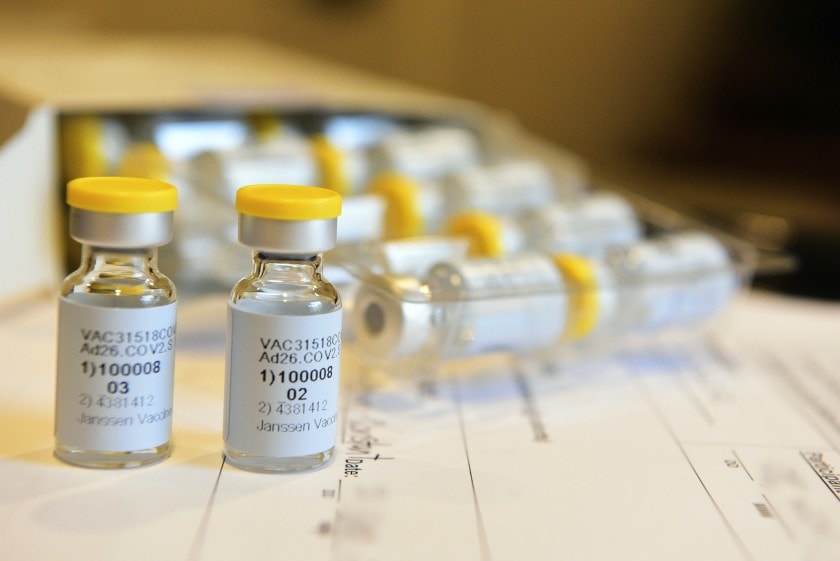
The first one-shot COVID-19 vaccine provides good protection against the illness, Johnson & Johnson reported in a key study released Friday, offering the world a potentially important new tool as it races to stay ahead of the rapidly mutating virus.
The pharmaceutical giant’s preliminary findings suggest the single-dose option may not be as strong as Pfizer’s or Moderna’s two-dose formula, and was markedly weaker against a worrisome mutated version of the virus in South Africa.
But amid a rocky start to vaccinations worldwide, that may be an acceptable trade-off to get more people inoculated faster with an easier-to-handle shot that, unlike rival vaccines that must be kept frozen, can last months in the refrigerator.
“Frankly, simple is beautiful,” said Dr. Matt Hepburn, the U.S. government’s COVID-19 vaccine response leader.
J&J plans to seek emergency use authorization in the U.S. within a week. It expects to supply 100 million doses to the U.S. by June — and a billion doses globally by year’s end — but declined to say how much could be ready if the Food and Drug Administration gives the green light.
Defeating the scourge that has killed more than 2 million people worldwide will require vaccinating billions. The shots being rolled out in different countries so far all require two doses a few weeks apart for full protection. More than 21 million Americans have received a first dose of Pfizer or Moderna shots since vaccinations began last month, but just 4 million have gotten their second dose.
Also Friday, regulators cleared a third option, AstraZeneca’s vaccine, for use throughout the European Union. The decision came amid criticism that the 27-nation bloc is not moving fast enough, as well as concern that there’s not enough data to tell how well the vaccine works in older people.
J&J studied its one-dose option in 44,000 people in the U.S., Latin America and South Africa. Interim results found the shot 66% effective overall at preventing moderate to severe COVID-19, and much more protective — 85% — against the most serious symptoms. There were no serious side effects.
“Gambling on one dose was certainly worthwhile,” Dr. Mathai Mammen, global research chief for J&J’s Janssen Pharmaceutical unit, told The Associated Press.
The vaccine worked better in the U.S. — 72% effective against moderate to severe COVID-19 — compared with 66% in Latin America and 57% in South Africa, where a more contagious mutant virus is spreading.
The reduced protection against that mutation is “really a wake-up call,” said Dr. Anthony Fauci, the top U.S. infectious-disease expert.
The more the virus is allowed to spread, the more opportunities it has to mutate. Vaccine makers are looking into how to alter their shots if necessary.
For now, the findings are an incentive “to vaccinate as many people as we possibly can,” Fauci stressed.
Data is mixed on how well other vaccines being used around the world work, but the Pfizer and Moderna shots were 95% protective in large U.S. studies.
It’s not fair to compare studies done before the record surges of recent months and discovery of new mutants — they might not turn out the same today, cautioned Dr. Jesse Goodman of Georgetown University, a former FDA vaccine chief.
The J&J protection is “good enough to help attack a pandemic,” Goodman said. “The advantage of having more vaccine, in a single shot, would be significant.”
Researchers tracked illnesses starting 28 days after vaccination — about the time when, if participants were getting a two-dose variety instead, they would have needed another shot.
After Day 28, no one who got vaccinated needed hospitalization or died, regardless of whether they were exposed to the original virus or “these particularly nasty variants,” Mammen said. When the vaccinated did become infected, they had a milder illness.
All COVID-19 vaccines train the body to recognize the new coronavirus, usually by spotting the spikey protein that coats it. But they’re made in very different ways.
J&J’s shot uses a cold virus like a Trojan horse to carry the spike gene into the body, where cells make harmless copies of the protein to prime the immune system in case the real virus comes along. It’s the same technology the company used in making a successful Ebola vaccine.
That’s similar to how AstraZeneca’s two-dose vaccine is made, although it’s not clearly exactly how well that one works. Tests in Britain, South Africa and Brazil suggested two doses are about 70% effective. An ongoing U.S. study may provide more information.
Still another vaccine is in final testing: Novavax reported this week that its vaccine appears 89% effective in a British study and that it also seems to work — though not as well — against new mutated versions of the virus circulating in Britain and South Africa. A larger study in the U.S. and Mexico is still enrolling volunteers.
Wall Street appeared dissatisfied with J&J’s results, with shares dropping 4.2% in early trading, a rare big drop for the world’s biggest maker of health care products. Its stock was down $4.07, or 2.4%, at $165.09 in mid-morning trading.
In contrast, tiny Novavax saw shares skyrocket, jumping 71% to $229.72 in mid-morning trading.
___
Republished with permission from the Associated Press.




One comment
Sonja Fitch
January 30, 2021 at 2:35 am
Of course in Florida, Duffus Desantis will continue to distribute to old rich white folks first! Publix is a damn racist company! Their public strategy is RACIST! May god have mercy on their souls !
Comments are closed.